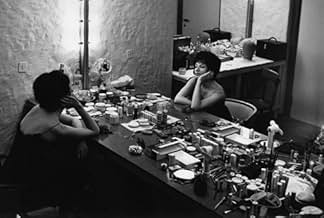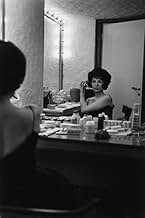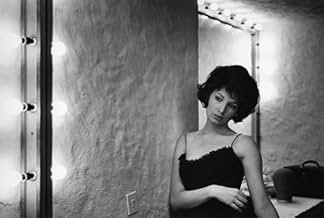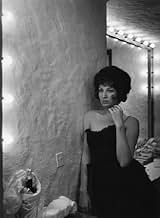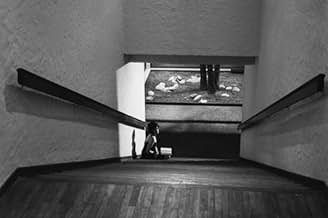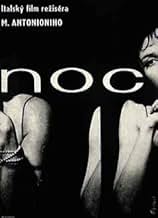Un giorno nella vita di una coppia sposata infedele e della loro relazione sempre più vacillante.Un giorno nella vita di una coppia sposata infedele e della loro relazione sempre più vacillante.Un giorno nella vita di una coppia sposata infedele e della loro relazione sempre più vacillante.
- Regia
- Sceneggiatura
- Star
- Premi
- 6 vittorie e 4 candidature totali
- Il signor Fanti
- (as Guido Ajmone Marsan)
- Sé stesso
- (non citato nei titoli originali)
- Un invitato alla festa
- (non citato nei titoli originali)
- Sé stesso
- (non citato nei titoli originali)
Recensioni in evidenza
After he concluded with the two lovers willingly not pursuing their feelings at the end of L'Eclisse, he turned inwards, and with each subsequent film he peered under one more veil of false perception. But what was he trying to look into in La Notte, what does he find here?
La Notte is a step behind L'Eclisse, naturally. Here love matters, or is thought that it should, to the bitter end. The finale is overbearing with pessimism then because love fails to be that saving grace, that we're still alone, consumed by our desires. But that's not all of it either.
Even when Mastroyanni painfully knows that the love he cherished has vanished with time and habit, he still clings to it. Even a dragging routine is preferable than the emptiness of solitude. This is how love functions here, as a shelter that soothes the existential pains, or a mask that mercifully obscures them.
But these people are not simply lost adrift in faceless crowds and cold rooms, they're clinging on the craving of desire for their salvation. When I say that the mind is not transcended yet in these films of Antonioni's alienation phase, it's because it still dictates desire, the terms under which a meaningful life should be pursued.
But to show that love is not our saving grace because it's subject to the whims and tedium of time would be to concede that we are merciless at the hands of higher forces beyond our control, that we're not masters of our fate. It was important in this aspect to go a step beyond, to show us characters become aware of the emptiness of desire by willingly giving up on it. But for that we'd have to go ahead to L'Eclisse and Il Deserto Rosso.
By itself La Notte may seem like it's laboriously pondering to say too little. As part of an oeuvre though, it has a place that can't be dismissed lightly.
All of these little, seemingly mundane moments are not all that the film is made up of, and it is in this existential (if it is relatively speaking) crisis for this couple that what real life that's out there and real pains strike up here and there. I loved the moment where Mastroianni is confronted by a seemingly crazy girl at the hospital; is she really crazy, or just desperate for someone's affection or attention (she is later beat into submission by the nurses)? Or when Moreau sees a fight break out with some young men in the less well-off section of town, the hesitation and surprise suddenly throws the fighters off. The party itself- where-in the 'Night' of the title is revealed- has moments of dialog that strike up the symbolic points Antonioni is making. But unlike the director's previous film, the visual-side of the cinematography has its moments but not necessarily as extraordinary in its overall make-up. Yet the initial peaks of interest- both in the actors (particularly Moreau who is always a treasure) and in the final, contemplative act with Monica Vitti, endures with better results.
Maybe the least in the 'trilogy' that Antonioni made between 1960 and 1962, which still makes it more watchable than the usual art-house bores of late. There is almost TOO much room for pondering about these characters, which makes for what could be seen as 'dull', but it really isn't. Detached, maybe, but not hard to connect with if open enough, this is a very good film if not one of the director's best.
Bosley Crowther had some kind words for the film, which also won a slew of awards: "Too sensitive and subtle for apt description are his pictorial fashionings of a social atmosphere, a rarefied intellectual climate, a psychologically stultifying milieu—and his haunting evocations within them of individual symbolisms and displays of mental and emotional aberrations. Even boredom is made interesting by him. There is, for instance, a sequence in which a sudden downpour turns a listless garden party into a riot of foolish revelry, exposing the lack of stimulation before nature takes a flagellating hand. Or there's a shot of the crumpled wife leaning against a glass wall looking out into the rain that tells in a flash of all her ennui, desolation and despair." To me, it all comes down to the cinematography. The casting of Jeanne Moreau and Monica Vitti was important, but the way we get that nice, stark and defined black and white is what I love to see. At a time the Americans had largely switched to color, some of the best in Europe were able to push black and white to the next level.
I don't want to get into the plot too much, but this film is more about feeling. The friction and differences between husband and wife are explored.
Antonioni doesn't force anything, he allows a scene to play out in proper time. This film is full of symbolism and despair.
Lo sapevi?
- QuizThis movie is considered the central film of a trilogy of alienation or unofficial "Incommunicability Trilogy" beginning with L'avventura (1960) and ending with L'eclisse (1962).
- BlooperWhen Giovanni pours champagne in the hospital, Bernhard Wicki (Tommaso) looks straight into the camera while turning his head from Lidia to Giovanni.
- Citazioni
Lidia: [reading from a piece of paper] "When I awoke this morning, you were still asleep. As I slowly emerged from my slumber, I heard your gentle breathing and through the wisps of hair over your face I saw your closed eyes and I could barely contain my emotion. I wanted to cry out, to wake you up, because you slept so deeply, you almost seemed lifeless. In the half light, the skin of your arms and throat appeared so vibrant, so warm and dry that I longed to press my lips against it, but the thought of disturbing your sleep, of you awake in my arms again, held me back. I preferred you like this, something on one could take from me bacause it was mine alone - - this image of you that would be everlasting. Beyond your face I saw my own reflection in a vision that was pure and deep. I saw you in a dimension that encompassed all the times of my life, all the years to come, even the years past as I was preparing to meet you. That was the little miracle of this waking moment: to feel for the first time that you were and always would be mine and that this night would go on forever with you beside me, - with the warmth of your blood, your thoughts, and your will mixed with mine. At that moment, I realized how much I loved you, Lidia, and the intensity of the emotion was such that tears welled up in my eyes. For I felt that this must never end, that all our lives should be like an echo of this dawn, with you no belonging to me but actually a part of me, something breathing within me that could could ever destroy except the apathy of habit, which is the only threat I see. Then you awoke and with a sleepy smile, kissed me, and I felt there was nothing to fear that we'd always be as we were at that moment, bound by something stronger than time and habit."
- ConnessioniFeatured in Cinq colonnes à la une: Episodio datato 1 dicembre 1961 (1961)
I più visti
- How long is La Notte?Powered by Alexa
Dettagli
Botteghino
- Lordo Stati Uniti e Canada
- 39.236 USD
- Fine settimana di apertura Stati Uniti e Canada
- 10.547 USD
- 18 set 2016
- Lordo in tutto il mondo
- 40.703 USD
- Tempo di esecuzione2 ore 2 minuti
- Colore
- Proporzioni
- 1.85 : 1
Contribuisci a questa pagina




